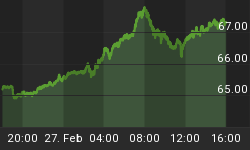Based on the December 12th, 2013 Oil Trading Alert
In our last essay on oil stocks from Dec. 2, we checked the oil-stocks-to-oil ratio to find out what impact it could have on future oil stocks' moves. Back then, we emphasized the strong positive correlation between the ratio and the oil stock index in recent months. As we wrote in the summary:
(...) connecting the long-, medium- and the short-term pictures, we clearly see that the ratio reached a strong resistance zone created by the long-, medium- and short-term lines. Although we saw breakouts above them, they all were invalidated. This is a strong negative signal for oil stocks holders, which suggests that further declines are just around the corner.
Since that essay was published, we have seen a downward move which took the ratio below the lower line of the gap between the April 2009 low and May 2009 high, which is not supportive for further growth. What impact did this event have on the oil stock index? Let's jump straight into the world of charts and take a look at the XOI in different time horizons. Let's start with a look at the monthly chart (charts courtesy by http://stockcharts.com).

On the above chart, we see that the situation has deteriorated and the XOI dropped below the upper line of the rising wedge. In this way, the breakout above this line was invalidated, which is a bearish signal. Despite this fact, the long-term uptrend remains in place at the moment.
To see the current situation more clearly, let's zoom in on our picture and move on to the weekly chart.

As you can see on the above chart, at the end of November the breakout above the upper line of the smaller rising wedge was invalidated, which was a bearish sign by itself. This negative event triggered further declines in the following weeks and took the XOI to its first medium-term support - the upper line of the rising wedge (marked with the red bold line) around 1,463.
Looking at the above chart, we see that the oil stock index extended its decline in the previous week and dropped below the support line. However, this deterioration was only temporary. The XOI rebounded and closed the week above the upper line of the rising wedge, which still serves as support.
Nevertheless, the position of the RSI and the sell signals generated by two other indicators, encouraged sellers to act and triggered further deterioration this week. As you see on the above chart, the upper line of the rising wedge was broken, therefore, the first target for the sellers will be around 1,439, where the bottom of the previous correction is. From this perspective, the next one target will be the May high at 1,430.
From the technical point of view, the medium-term uptrend remains in place at the moment, and the situation is still bullish.
Now, let's turn to the daily chart.

Looking at the above chart, we see that the situation has deteriorated significantly since our previous essay on oil stocks was published.
Quoting our Oil Trading Alert from Monday:
(...)If the XOI moves above 1,475, we may see further improvement and an attempt to move above 1,483 (the previous 2013 top). On the other hand, if oil stocks drop below 1,457, we will likely see further deterioration. In this case, the first downside target will be the 50-day moving average (currently at 1,453). If it's broken, we may see a downward move to a support zone created by the upper line of the rising wedge (marked with the thin black line) and the bottom of the correction that we saw at the beginning of November (around 1,440-1,446).
As you can see on the above chart, yesterday the oil stock index dropped below 1,457, which encouraged sellers to act. In the following hours, the XOI declined below its 50-day moving average and reached the upper line of the rising wedge. In this way, oil stocks moved to their support zone, which may encourage buyers to push the buy button. If it happens, we may see an upward corrective move to around 1,475.
However, when we take a closer look at the chart, we can notice a head and shoulders pattern. The yesterday drop pushed the XOI below the neck line (marked in blue), which may trigger further deterioration. According to theory, the price target for this formation will be around 1,410. Nevertheless, before the sellers realize their scenario they will have to push the oil stock index below this support zone.
Summing up, from the long- and medium- term perspectives, the outlook for oil stocks remains bullish and the uptrend is not threatened at the moment. However, taking into account the medium- and short-term sell signals, further deterioration should not surprise us.
Thank you.















